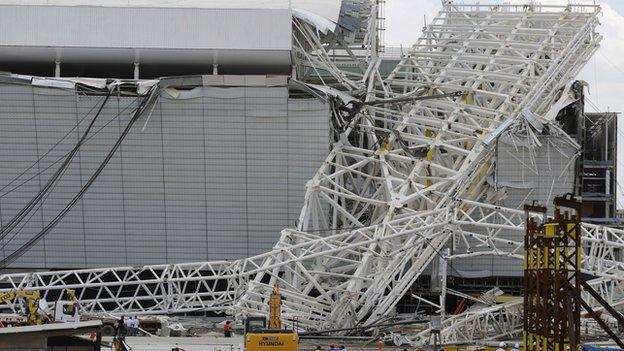World Cup stadium accident increases the pressure on Brazil
- Published
The BBC's Gary Duffy: "Things have gone drastically wrong here today"
When the accident at the new Itaquerao Stadium is viewed in the wider context of preparations for the 2014 World Cup, it should not be forgotten that two workers have been killed and one injured.
But against the backdrop of protests and social discontent, concerns over infrastructure and fears about crime in Brazil's major cities, the incident in Sao Paulo turns what has been a drip of bad news into a downpour.
Brazil is quickly learning what the likes of South Africa, China, Greece and even the United Kingdom have found in recent times.
Namely that when you win the right to host one of the world's major sporting events, you had better be prepared for international eyes to focus on you in a way they have never done before.
The South American country is under the spotlight and the collapse of a crane onto the stadium that is due to host the opening match of the World Cup in less than 200 days has raised even more questions.
Six of Brazil's 12 stadiums were ready for last summer's Confederations Cup, while the remaining six are racing to be finished in time.
Several stadiums are well behind schedule, while one host city, Cuiaba, has told the BBC that not only will it miss its completion deadline, there are also not enough hotel rooms for visiting fans. In the city of Manaus, construction is now 24 hours a day.
But what of Sao Paulo? Could this accident have resulted from the need to speed up building work? And what does it mean for the World Cup?
Fifa has launched an investigation but even its most senior figures were wary of jumping to conclusions on Wednesday, with details still uncertain. Some commentators immediately suggested the opening match might be switched to Rio's Maracana Stadium.
But the facts paint a slightly different picture. The new Itaquerao stadium was, before this accident, 94% complete and had been due to be handed over to Fifa in January, just a few weeks after the December deadline they had originally been set.
The second key piece of information was the statement from the construction company that insisted early investigations were showing that the structure of the stadium had not been damaged, only the roof and the exterior facade.
Senior sources from Corinthians told BBC Sport that there was, despite the obvious sadness, no suggestion that this setback was one that would prevent them hosting matches next summer.
And what of safety? Odebrecht, the firm building the stadium, is one of the world's foremost construction companies.
Brazilian-owned and Brazilian-run, a fortnight ago its US arm was voted one of America's safest companies. It built the impressive arena in which NBA side Miami Heat play their home matches, while its revenues topped $40bn (£25bn) in 2012. It is vast.
Unsurprisingly, the Odebrecht Group has secured a number of major contracts related to the World Cup and the 2016 Rio Olympics. These include the renovation of the spectacular Arena Fonte Nova in Salvador, which made headlines when 36 roof panels came loose after rain fell in June, the Pernambuco Arena in Recife and the problematic Maracana, which was only just ready for England's friendly with Brazil last June.
It has launched an investigation of its own into the Sao Paulo tragedy.
The path to major sporting events rarely runs smoothly.
London had spiralling costs, security concerns, fears over terrorism and complaints about tickets and yet the Olympics will be remembered as a joyous celebration of sport and success. In South Africa, the headlines were about legacy, or the lack of it, crime, poverty and human rights issues. The issues were endless when Delhi hosted the 2010 Commonwealth Games. Brazil is next in line.
So often the glory and golden moments created by the sport wipe away the memory of a troubled build-up. To some, the Confederations Cup was one month-long protest, where it was impossible to cross the street without being involved in a skirmish.
The truth was, to those of us who were there, it was the brilliance of Brazil and the way the nation united behind its footballers that lingers in the mind, rather than protests that were harder to find than to avoid.
When it comes to football, Brazil has always been ready. This football-mad nation was never going to host a World Cup of staggering efficiency, as Germany did in 2006. On time in Brazil has a very different meaning. But it is that very quality that beguiles us and will do again next summer.
- Published27 November 2013

- Attribution
- Published26 November 2013
- Published6 December 2013

- Published7 June 2019
